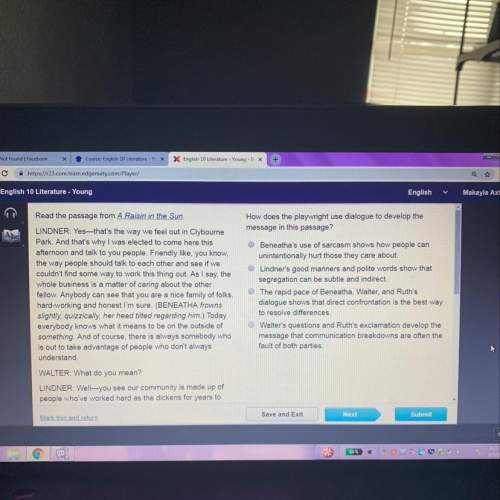
English, 11.01.2020 03:31 cfnewton09
Passage 1 if by rudyard kipling if you can keep your head when all about you are losing theirs and blaming it on you, if you can trust yourself when all men doubt you, but make allowance for their doubting too; if you can wait and not be tired by waiting, or being lied about, don't deal in lies, or being hated, don't give way to hating, and yet don't look too good, nor talk too wise: if you can dream—and not make dreams your master; if you can think—and not make thoughts your aim; if you can meet with triumph and disaster and treat those two impostors just the same; if you can bear to hear the truth you've spoken twisted by knaves to make a trap for fools, or watch the things you gave your life to, broken, and stoop and build 'em up with worn-out tools: if you can make one heap of all your winnings and risk it on one turn of pitch-and-toss, and lose, and start again at your beginnings and never breathe a word about your loss; if you can force your heart and nerve and sinew to serve your turn long after they are gone, and so hold on when there is nothing in you except the will which says to them: "hold on! " if you can talk with crowds and keep your virtue, or walk with kings—nor lose the common touch, if neither foes nor loving friends can hurt you, if all men count with you, but none too much; if you can fill the unforgiving minute with sixty seconds' worth of distance run, yours is the earth and everything that's in it, and—which is more—you'll be a man, my son! passage 2 a squirrel meets the winter squirrel was rapidly racing around the forest. she had lost her winter stash of acorns, with only a few weeks until the first snowfall. her hibernation home inside a cozy evergreen was all set, but she misplaced the nuts that were to be her food. squirrel hectically searched all the trees near her, but came up empty-handed. she was beginning to panic when she imagined herself running around the trees looking foolish. she stopped, caught her breath, and began to come up with a plan. rather than focus on what was lost, squirrel knew what must be done. she dug down deep and began to gather a new batch of nuts for the oncoming winter. not once did squirrel falter in her quest, even as she began to grow tired and felt the weight of the looming weather on her tail. squirrel pressed on. it was difficult, and many times she felt like complaining to the other animals in the forest, but they saw her determination and began to pitch in. squirrel was overwhelmed and . squirrel's behavior began to rub off on the rest of the forest animals. during the end of the following summer, everyone pitched in. squirrel's ego swelled a bit with pride that her example created teamwork in the forest, and she began distancing herself from the others. she had set an example, but she had forgotten the lesson she too had learned. 2 in the first selection, humans are the main characters. in the second, a squirrel is the main character. how is the main idea in both pieces still the same, even though the subject of each is a different species? a. humans and animals can demonstrate will and determination. b. humans and animals like to act majestic and above others. c. nature is not to humans and animals. d. complaints are common with humans and animals. reset submit compare and contrast tools save session questions: 0 of 10 answered 12345678910 answered current unanswered 1 of 10 answeredsession timer: 16: 50 session score: 100% (1/1)

Answers: 2


Another question on English

English, 22.06.2019 04:30
Consider the title and souce of the following articles. which one is most likely to exhibit a bias? (a) how to roast beef," by the food editor of a magazine (b) americans experiencing greater fatigue than previous generations, " by a harvard researcher (c) "americans' worsening eyesight not related to computer screen usage," by the public relations director of a major computer manufacturer (d) "sharing the burden: a history of cooperation," by a college professor
Answers: 1

English, 22.06.2019 04:30
Identify an example of an epic simile in book 13, book 21, or book 24 of the odyssey and explain how it is different from a typical simile.
Answers: 3

English, 22.06.2019 05:00
What is the source of tension in this excerpt? ellery searching everything insects filling the light fixtures ellery standing on the desks louise carpenter whispering
Answers: 3

English, 22.06.2019 05:30
Which of the following is most likely to influence the plot of a story
Answers: 1
You know the right answer?
Passage 1 if by rudyard kipling if you can keep your head when all about you are losing theirs and b...
Questions







Mathematics, 06.12.2019 22:31





Mathematics, 06.12.2019 22:31



Geography, 06.12.2019 22:31

Health, 06.12.2019 22:31

Mathematics, 06.12.2019 22:31



Mathematics, 06.12.2019 22:31




